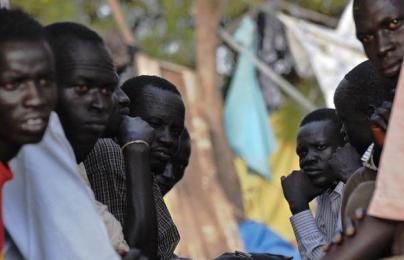S. Sudan crisis blamed on mismanagement by leadership
February 13, 2016 – A new report by a United States-based international organisation has blamed the government of South Sudan under President Salva Kiir for mismanaging the country’s affairs resulting to crisis in the world’s youngest nation.

The report, “Addressing South Sudan’s Economic and Fiscal Crisis,” calls for action by the international community, and also for commitment by the warring parties, the government and opposition faction of SPLM-IO led by the newly appointed First Vice President, Riek Machar, to put the needs of the people ahead of their own.
It lamented that the country’s population currently suffers from severe shortages of food, fuel, and medical supplies as a result of the war and economic near collapse.
“South Sudan’s economic and political crises are exacerbating each other, and the population is paying dearly. These interlocking crises and the gross mismanagement of resources by the government have undermined prospects for international support,” said John Prendergast, Founding Director of the Enough Project.
He added that the kind of international pressure exerted on the warring parties in support of the signing of the August 2015 peace accord is again needed at “this critical stage to fight mass corruption and adopt responsible economic policies.”
Brad Brooks-Ruben, Director of Policy at the Enough Project said the government’s “ill-advised” monetary policies create a “toxic situation.”
“South Sudan’s policy-makers must re-balance skewed government spending to ensure that the current food crisis caused by depreciation of local currency and inflation does not threaten the whole population,” he said.
“South Sudan’s fiscal crisis is a painful illustration of how the country’s leaders have strong incentives to seize power but extremely weak incentives to govern effectively,” commented J.R. Mailey, Senior Policy Analyst at the Enough Project.
The report decried the fact that the government’s spending is skewed in favor of security even in the face of the current urgent humanitarian crisis and growing concerns of potential widespread famine.
Consumers, it said, must either pay five times as much for essential food items or purchase a fifth of the volume of food that they need. Many people cannot afford to buy food or other basic goods and services, it further observed.
“Fuel prices have tripled—almost quadrupled—by some reports. Fuel shortages have been responsible for the deaths of some of the country’s most vulnerable people.”
The Enough Project, an atrocity prevention policy group, seeks to build leverage for peace and justice in Africa by helping to create real consequences for the perpetrators and facilitators of genocide and other mass atrocities.
The organization says it aims to “counter rights-abusing armed groups and violent kleptocratic regimes that are fuelled by grand corruption, transnational crime and terror, and the pillaging and trafficking of minerals, ivory, diamonds, and other natural resources.”
It has been conducting field researches in conflict zones, developing and advocating for policy recommendations and support social movements in affected countries as well as mobilize public campaigns.
(ST)
